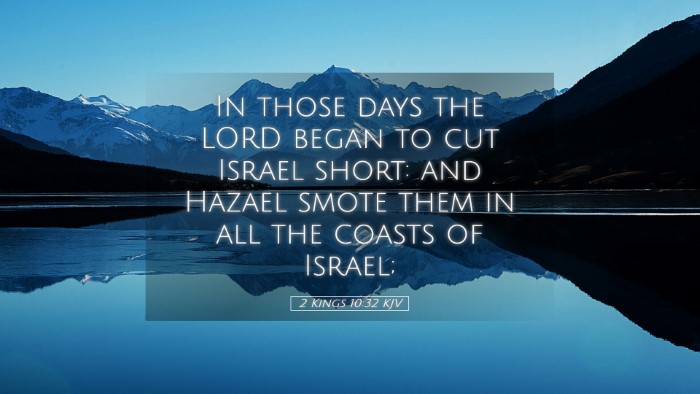Commentary on 2 Kings 10:32
The verse states: "In those days the LORD began to cut off parts of Israel; and Hazael smote them in all the coasts of Israel" (2 Kings 10:32, KJV). This passage marks a significant turning point in the history of Israel, demonstrating God's sovereign control over nations and His divine judgment upon His people for their unfaithfulness.
Contextual Analysis
In the broader narrative of 2 Kings, we observe the decline of the Northern Kingdom of Israel following the reign of Jehu, whose violent overthrow of Ahab's house led to a temporary purification of Israel's worship. However, Jehu's subsequent failure to lead the nation in complete loyalty to Yahweh resulted in God's judgment. This verse introduces the reader to the consequences of Israel's idolatry, summarized succinctly in Hazael’s military aggression against Israel as a manifestation of divine discipline.
Theological Reflections
Theologically, this passage emphasizes several important themes:
-
Divine Sovereignty: The text highlights that it is the Lord who begins to "cut off parts of Israel." This phrase indicates that the events unfolding are not merely political or random; rather, they are directed by God's providential hand.
-
Judgment and Mercy: While God's judgment is evident, there is also an implicit reminder of the mercy He extends by warning and calling His people back to repentance—a theme central to the prophetic messages throughout Kings.
-
Human Agency: Hazael's actions illustrate the interplay between divine sovereignty and human action. God uses Hazael, a foreign leader, to enact His judgment, demonstrating that God can employ anyone to fulfill His purposes.
-
National Decline and Spiritual Implications: The decline of Israel parallels its spiritual state. As the nation strayed further from God, the consequences began to manifest in their geopolitical vulnerability.
Commentary Insights
Matthew Henry's Commentary provides a detailed reflection on the implications of this verse:
-
Judgment as a Tool for Purification: According to Henry, the loss of territory and prominence in the northern regions of Israel serves as a divine strategy to bring attention to the people’s sins. By cutting off parts of Israel, God aims to restore a remnant that is faithful—a recurring motif throughout biblical history.
-
The Role of Hazael: Henry further notes that Hazael, as an instrument of judgment, demonstrates that God can use even those who do not worship Him to achieve His ends. This serves as a poignant reminder that God's purposes transcend human understanding and allegiance.
-
Implications for Future Generations: The consequences faced by Israel underscore the generational impact of disobedience. The historical account illustrates how quickly a nation can decline when it turns from righteousness. Leaders today should take heed—there is often a direct covenantal relationship between divine blessing and national faithfulness.
Albert Barnes' Commentary
Albert Barnes expands on the geopolitical context:
-
Destruction of Israel: Barnes emphasizes the idea that Hazael’s conquest reflects not only God’s judgment but also the inevitable decline of Israel due to their continued polytheism. Hazael’s actions represent a culmination of the divine decree set against a rebellious nation.
-
Factional Struggles: The period of political struggle and factionalism within Israel following Jehu’s reign is critical here. Barnes notes that the weakening of a kingdom from within makes it vulnerable to external threats, illustrating a spiritual truth: unaddressed sin creates a vacuum for adversity.
Adam Clarke's Commentary
Adam Clarke provides a historical lens:
-
Historical Significance: Clarke asserts that this era of decline is not an isolated moment but part of a larger historical continuum that affects the future trajectory of both Israel and Judah. The refusal to heed prophetic warnings results in cycles of judgment and restoration.
-
The Call to Repentance: Clarke calls attention to the persistent invitation of God to repentance, even at this late hour. The rise of Hazael should serve as a catalyst for introspection and return to covenant fidelity among Israel’s populace.
-
Hazael’s Character: Clarke also reflects on Hazael's unforeseen rise from servant to king, which serves as a cautionary tale about the motivations of political leaders and their ultimate accountability to God.
Conclusion
As we ponder the implications of 2 Kings 10:32, we recognize the multi-layered nature of God’s dealings with nations and individuals. This verse serves as a stark reminder of the consequences of turning away from God and illustrates the powerful theme of divine sovereignty in all historical events. The reflections from various commentators encourage modern readers—be they pastors, theologians, or students—to engage with the text both critically and devotionally, recognizing that the God who disciplines His people is also the one who calls them back to Himself.


